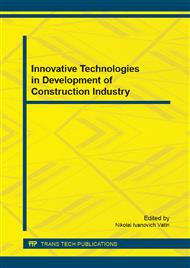p.977
p.984
p.990
p.996
p.1002
p.1007
p.1013
p.1019
p.1025
New Paradigm of Integrated Housing Development in the Metropolitan Area (Based on the Example of St. Petersburg)
Abstract:
The article studies the development of an integrated residential housing in Russian metropolises. One of the pressing issues of the modern real estate market development in a metropolis is the need for stirring up investment processes in the housing sector. Study of the problems associated with the formation of integrated residential development and social orientation of housing, are hampered by a number of factors, primarily related to the lack of the mechanism of management of investments into an integrated housing in the metropolitan area, a rather complicated structure of the public administration system, lack of clarity combined with a certain duplication of functions conferred on authorities, unclear mechanism of interaction between the participants of the investment process, and many others.While studying problems of the formation of the residential development for a large city, authors used the methods of logical analysis, synthesis and comparison. A systematic approach, methods of scientific abstraction and expertise have allowed authors to identify the main problems and specific features of the large Russian cities’ residential areas development; on this basis they formulated the main principles of urban planning policy in the sphere of housing construction, and grounded the necessity of developing a monitoring system of integrated development.
Info:
Periodical:
Pages:
1002-1006
Citation:
Online since:
January 2015
Authors:
Price:
Сopyright:
© 2015 Trans Tech Publications Ltd. All Rights Reserved
Share:
Citation:


